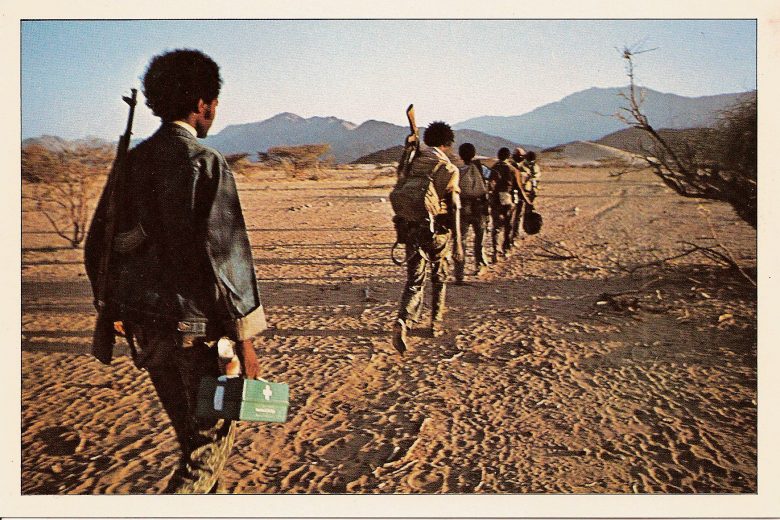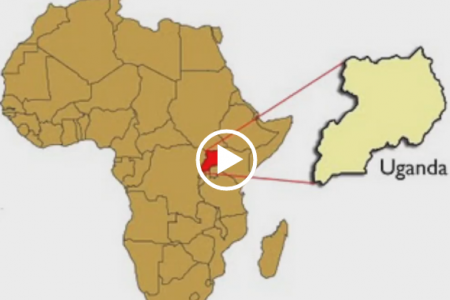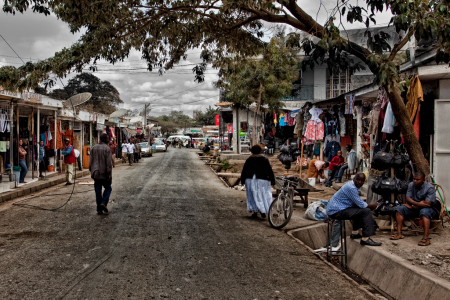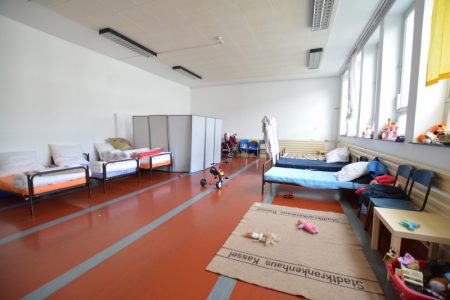Ariam, Aaron, Samson and Abel have fled Eritrea to search for a better life in Europe. Their journey from Eastern Africa to Germany, where they have finally found shelter, has clearly left marks on the young men’s souls, as some of them suffer from deep trauma. Their story shows, why leaving for a life in Germany has been both a blessing and curse.
A thin layer of snow is covering the hills surrounding Waldhausen, a small village in Western Germany. The air is crisp, every breath visible. The streets are lined by old brick houses. Each one of them looking differently, but still the same. Waldhausen is the epitome of what a provincial German village would look like. This place is now home of Aaron, Samson, Ariam and Abel* – four young men who made their way from Eritrea to Germany.
20-year-old Ariam opens the door with a friendly smile on his face. He is living with his younger brothers, Aaron (16) and Samson (18) and their friend Abel (24) in a small house. The boys were housed by an elderly German couple, who has been giving shelter to refugees for a couple of years now. While Ariam closes the door, the other boys are waiting in the living room. They introduce themselves, with a curious look on their faces. As they sit down the room becomes quiet. It’s a bit of an awkward silence.
Ariam, Aaron, Samson and Abel are from Adi Quala, a village close to the border of Ethiopia in the south of Eritrea. Their homeland is known for its system of forced labour. Every person has to serve the country. Whether they are male or female, young or old. They are being paid around 10 Euros a month for often hard physical work. Whoever decides to leave is facing a harsh punishment in one of the country’s detention camps. The Government is therefore being accused for human rights violations. This principal makes Eritrea one of the fastest-emptying countries, according to Wall Street Journal. Human Rights Watch has published the number of refugees fleeing from Eritrea: It’s an average number of 4000 persons per month. Each one of them leaving their homes and families, risking their lives while searching for a better one somewhere else in the world.
The four boys, who are now living in this peaceful little village of Waldhausen have faced the same destiny. They left their families, their parents and younger siblings, to get to Europe. While Abel and Ariam fled together, the younger ones, Aaron and Samson, were on their own. They made their way from Eritrea to Ethiopia, then crossing the Sahara through Sudan and Libya and finally reaching Italy after crossing the Mediterranean Sea in wobbly, unstable boats. During these times their lives were in the hands of smugglers. Ariam breaks the silence. “They are cruel people. They put around 30 people in a jeep and race through the dunes of the desert. If someone falls off the car, they don’t stop. This person is lost”, he says. His younger brother Aaron remembers how the cars passed the mortal remains human beings. “The smugglers would point to the bones and say ‘Look, there are your brothers and sisters!’”
Staring at the framed photo
Being asked about their journey, the boys become rather quiet. The friendly smiles on their faces are replaced by a rigid frown, a numb expression in their eyes. Their escape has clearly left scars on the boys’ souls.
Especially the youngest one, Aaron, is really struggling a lot. “One day he would see my wife in the kitchen and burst into tears, because he simply misses his mother”, says the boys’ “German father” Klaus*. Aaron is willing to show his bedroom. It’s a small but cozy room. A soft bright carpet is covering the floor. A big dumbbell is laying in the corner. “Sometimes I do a little work out with it”, Aaron says and chuckles shyly. A bed, a cupboard and a desk. The small window on the sloping roof gives a view on the snowy hills and the coniferous forests of the Sauerland-region. This place is peaceful and quiet. “I like this room”, says Aaron. Back home in Eritrea he would share his room with the rest of the family. He heads back to the living room where the other boys are waiting.
Ariam, Samson and Abel have gathered around a framed photo. Aaron joins the boys. He points on the photo. “This is my dear mother, my father and my siblings”, he says. The boys stare at the faces of their relatives. They haven’t seen them for more than a year now. Sometimes they call each other, but not too often. Since the boys have left Eritrea, their family is facing problems. “When the Government found out that we had fled the country, they put our father in jail”, says Ariam.
Was escaping and therefore risking their lives and their families’ safety still worth it? “We had no choice”, says Ariam. All of them have experienced how their parents where suffering under the system of forced labour. They have experienced how their fathers were taken away from their families for years to drudge somewhere else in the country. They have experienced how it feels to live in a country without freedom. “It is no option to stay in Eritrea.” Ariam was the first brother who had taken the riskful journey to Europe. “I didn’t expect it to be this hard. But once you leave, there no chance to return. As soon as you leave the country, you have to face your destiny and go on.” There is no giving up. “God helped us”, says Ariam.
Blessing and curse at the same time
The four boys are Coptic Christians. On their way to Germany their faith helped them not to give up. No matter how hard it was. The only belongings Ariam had with him was a small bag with his documents, a couple of photos as a memory and a small bottle of water. “When we crossed the sea, the boat was flooded with water. I lost a lot of my belongings. The only memory we have now is this photo”, Ariam says and points to the framed picture. Meanwhile Daniel takes out his phone and searches for an Eritrean Gospel song on Youtube. As he presses the play-button s pixelated video starts flickering on his phone’s scratched display. After a couple of seconds the boys quietly start to join the chanting, clapping their hands and listening to the song till the end.
Finally being settled and living in Germany has been both a blessing and curse for the family. The boys are lucky to have escaped the Eritrean system of forced labour and have been fortunate to have found shelter in a comfortable place instead of an overcrowded refugee-camp. At the same time, they have to live with the uncertainty of their own future and sustaining danger for their families. Nobody knows if they will ever be able to return to their home, which they love and miss despite all the terrible living conditions. They will have to get used to snowy forests, instead of dusty hot veldts. Despite the blessing of security, they will have to restart their lives, try to cope with the memories that are haunting them and get used to the notion of being far away from their beloved ones.
*Names changed
Photo credits:



